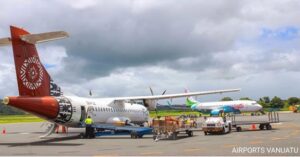
FY20 was a year of highs and lows
AVL saw record passenger statistics achieved across our three airports in February, of 776,000 passenger movements in the previous 12 months, up 8% year on year. Then overnight the State of Emergency resulted in the closure of Vanuatu’s borders and suspension of flying. As a result, the aviation industry has suffered a significant loss this year and AVL has felt the full force of that loss. For the year ending September 2020, AVL processed 465,000 passenger movements, down 37% on the previous year.
- In the September quarter, total passenger traffic is 74% down on the same period last year, meaning only one person is travelling now, for every four people previously.
- Domestic flying recommenced in April, but capacity has been constrained by Air Vanuatu’s available fleet. Domestic passenger movements for the September quarter are down 53% on a year ago.
- International air travel continues to operate in a limited capacity under the direction of the National Disaster Management Office to enable humanitarian relief, repatriation and cargo flights. Just over 3,000 international passengers travelled during the August quarter, 97% down on a year ago.
Flow on impacts of reduced air travel on AVL
Inevitably with the impact of reduced air travel, AVL has had to make major changes to our business, reflecting the reduced air services and associated revenues. All AVL employees are currently on reduced hours, our airports have reduced hours of operation and some areas of our terminals are closed off. A number of capital projects for airport operations have been deferred and our Management Team and Board anticipates the new financial year will continue to bring challenges to our business, until such time as quarantine-free travel and commercial aviation can resume.
Flow on impacts of reduced air travel on the Vanuatu economy
The absence of regular international air services has been felt by virtually every resident of Vanuatu, either directly in not being able to travel freely, or indirectly in that the absence of goods, services and international visitors is seriously impacting our economy and society. Everyone knows someone whose life has been turned upside down. They’re out of work or a loved one is trapped overseas.
International visitors spend money in resorts, with public transport drivers, with tour operators, in restaurants, shops, markets and through the employment they generate, their direct spend flows through to all shops and services. International visitors are more than tourists. They’re expert technicians who are required to maintain equipment. They’re doctors providing specialist services. They’re friends and relatives of Vanuatu residents.
AVL remains optimistic that international travel will return but the question is when and how. We are committed to working with our partners to make that happen in a safe way, but until that time comes, everyday people will continue to feel the absence of international aviation in our lives.
AVL welcomes steps to open the Tasman Bubble



















